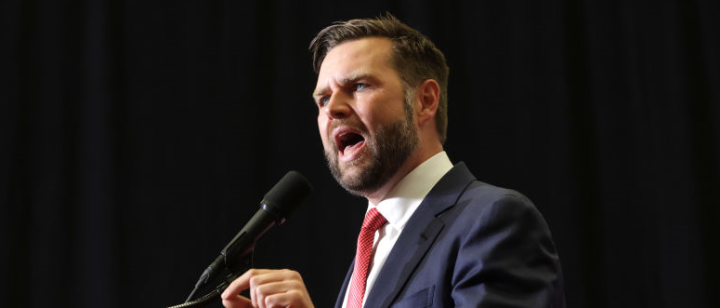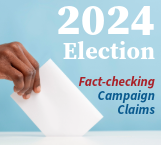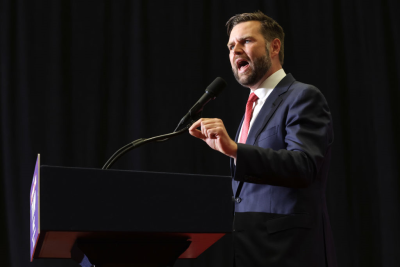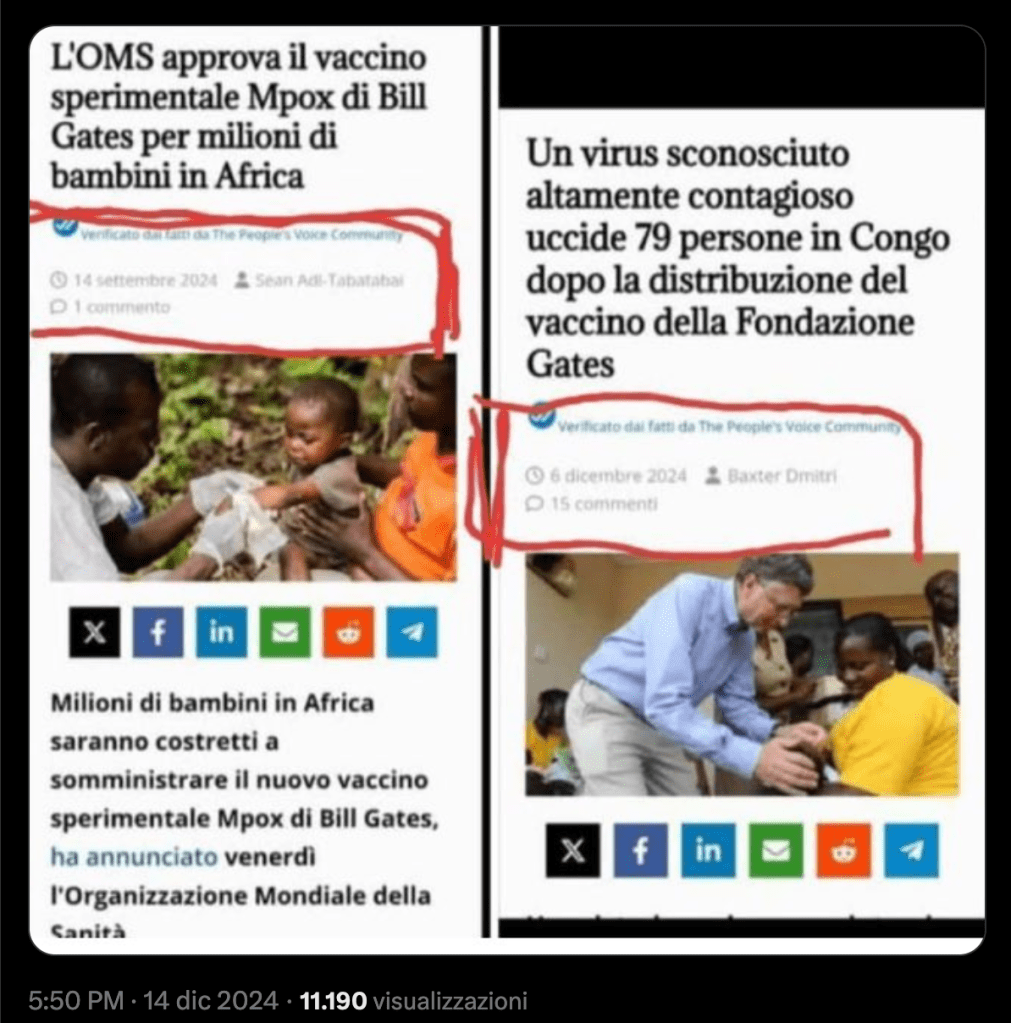
In his first two solo rallies as the Republicans’ vice presidential nominee, Sen. JD Vance took aim at Vice President Kamala Harris. But in several instances, Vance twisted Harris’ words or her record.
- Vance said Harris “supported abolishing ICE [Immigration and Customs Enforcement].” Back in 2018, Harris said elected leaders should “critically reexamine ICE and its role” but she did not call for abolishing the agency and all its functions.
- He said Harris “wanted to defund the police.” Harris talked repeatedly about “reimagining public safety and how we achieve it” but she never advocated slashing or cutting police budgets altogether.
- Vance said Harris had failed as “America’s border czar,” but Harris’ role in the Biden administration was to address the “root causes” of immigration in El Salvador, Guatemala and Honduras.
- Vance said Harris “called Joe Biden a racist and then ran with him two months later.” During a Democratic primary debate in 2019, Harris criticized Biden’s position on two race-related issues, but she began her comments, “I do not believe you are a racist.”
- Vance said that Harris “voted to eliminate the filibuster and pass the green new scam.” Harris said in 2019 that she was “prepared to get rid of” the procedural rule to pass the so-called “Green New Deal,” but that nonbinding resolution never received a vote.
In back-to-back solo rallies on July 22, Vance spoke in his hometown of Middletown, Ohio, and then in Radford, Virginia. Many of Vance’s attack lines parroted the talking points contained in a National Republican Senatorial Committee memo that paints Harris as “an avowed radical.”
Harris on ICE
In his speech in Virginia, Vance distorted the facts in claiming that Harris “supported abolishing ICE.” He’s referring to U.S. Immigration and Customs Enforcement, the Department of Homeland Security agency charged with “enforcing immigration laws to preserve national security and public safety.”

Back in 2018, several Democratic leaders were making calls to abolish ICE. On her campaign website when she ran for a House seat in New York in 2018, Alexandria Ocasio-Cortez wrote that ICE represented “part of an unchecked expansion of executive powers that led to the widespread erosion of Americans’ civil rights.” In calling for abolishment of the agency, Ocasio-Cortez claimed ICE “operates with virtually no accountability, ripping apart families and holding our friends and neighbors indefinitely in inhumane detention centers scattered across the United States.”
While serving as a senator in June 2018, Harris was also critical of the way ICE operated during former President Donald Trump administration — such as its enforcement of Trump’s “zero tolerance” border policy that resulted in children being separated from their parents who were detained for entering the U.S. illegally. Harris said the government should “critically reexamine” ICE’s role, adding that might mean “starting from scratch.” Here’s the relevant part of a June 2018 interview with MSNBC’s Kasie Hunt (starting at the 8:55 mark).
Hunt, MSNBC, June 24, 2018: A lot of the signs at the rally you just held were people standing there saying, ‘Abolish ICE.’ Is that a position that you agree with?
Harris: Listen, I think there’s no question that we’ve got to critically reexamine ICE and its role and the way it is being administered and the work it is doing. And we need to probably think about starting from scratch, because there’s a lot that is wrong with the way that it’s conducting itself. And we need to deal with that.
Hunt: What do you think should be the alternative to ICE?
Harris: Well, first of all, I don’t think that the government should be in the position of separating families. And that is clearly what is part of what’s happening at ICE and DHS. You look at what’s happening, again, in terms of how they’re conducting their perspective on asylum seekers. That is a real problem and is contrary to all of the spirit and the reason that we even have the asylum rules and laws in the first place. So their mission, I think, is very much in question, and has to be reexamined.
In an interview on “The View” in July 2019, Harris was asked if she would get rid of the Department of Homeland Security, which oversees ICE.
“I would not,” Harris said. “We need to restructure and reform it. … We need to deal with it and fix it, but I do not believe in getting rid of it.” Several times, Harris added, “I believe in border security.”
So Harris called for reexamining the way ICE was functioning under the Trump administration, and she talked about the possibility of “starting from scratch.” But she never called for abolishing the agency and its functions altogether.
Harris on Defunding the Police
Vance said Harris “wanted to defund the police,” adding, “even Joe Biden never went so far as to say he wanted to defund the police.” Neither did Harris.
 Sen. JD Vance, the Republican vice presidential nominee, speaks at a campaign rally on July 22 in Radford, Virginia. Photo by Alex Wong/Getty Images.
Sen. JD Vance, the Republican vice presidential nominee, speaks at a campaign rally on July 22 in Radford, Virginia. Photo by Alex Wong/Getty Images.Rather, in a series of interviews in mid-June 2020, Harris carefully drew out her position on the “defund the police” movement that arose in the wake of protests and riots in response to the death of George Floyd, a Black man, after a white police officer kneeled on his neck during an arrest in Minneapolis on May 25, 2020.
In her interviews, Harris talked about “reimagining public safety and how we achieve it.” The answer, she said, is not “more police on the streets” but rather investing more in struggling communities — in things such as education, job creation, affordable housing and health care — as a way to make them safer. She never agreed that that meant slashing or eliminating police budgets.
As we have written, there is no agreed upon definition for the term “defund the police.” Some critics of the police, who believe there is systemic racism in law enforcement, really do want to abolish police forces and replace them with other community safety entities. Others advocate shifting some money and functions away from police departments to social service agencies.
Amid the Floyd protests, Harris put herself at the forefront of the debate about police conduct. On June 8, 2020, she co-sponsored a bill that sought to increase accountability for law enforcement misconduct and to eliminate discriminatory policing practices. At that time, Biden was the presumptive Democratic nominee. Harris was picked as Biden’s vice presidential running mate until August.
In an interview on ABC’s “The View” the same day, June 8, 2020, Meghan McCain asked if Harris supported “defunding and removing police from American communities.”
Harris, ABC’s “The View,” June 8, 2020: I think that a big part of this conversation really is about reimagining how we do public safety in America. Which I support, which is this: We have confused the idea that to achieve safety, you put more cops on the street instead of understanding to achieve safe and healthy communities you put more resources into the public education system of those communities, into affordable housing, into home ownership, into access to capital for small businesses and access to health care regardless of how much money people have. That’s how you achieve safe and healthy communities. …
Here’s the other thing, when I talk to law enforcement, they know that they don’t want to be nor are they skilled to be the ones who are responding to someone with mental illness or substance abuse or–or the homeless population, but in many cities, that’s what’s happening because we are not directing those resources, those public resources to where they need to go, which is addressing mental health, homelessness, substance abuse, so that we don’t have to have a police response because we are smarter.
McCain: … Are you for defunding the police?
Harris: How are you defining “defund the police”?
McCain: Well, I’m not for anything remotely for that, so I would ask the protesters the same thing, but I … assume it’s removing police, and as congresswoman Ilhan Omar said, bringing in a whole new way of governing and a law and order into a community.
Harris: … So, again, we need to reimagine how we are achieving public safety in America and to have cities where one-third of their entire budget is going to policing but yet there is a dire need in those same cities for mental health resources, for resources going into public schools, resources going into job training and job creation.
Harris hit the same themes in an interview the same day on MSNBC, adding, “We don’t want police officers to be dealing with the homeless issue. We don’t want police officers to be dealing with substance abuse and mental health. No — we should be putting those resources into our public health systems, we should be looking at our budgets and asking, ‘Are we getting the best return on our investment as taxpayers?’”
In an interview with George Stephanopoulos on ABC’s “Good Morning America” the following day, June 9, 2020, Harris said accusations from Trump that radical left Democrats supported defunding the police, Harris characterized that as “creating fear where none is necessary.” In that same interview, she said she applauded then-Los Angeles Mayor Eric Garcetti’s proposal to reallocate about $150 million from policing to health and youth initiatives. And she again stressed the need to “invest in communities” to make them healthy and safer.
“We have to stop militarization of police,” Harris said. “But that doesn’t mean we get rid of police. Of course not. We have to be practical about this.”
In a Sept. 6, 2020, interview on CNN, after she was the Democrats’ vice presidential nominee, Harris was asked about a quote from her 2009 book about support for more police on the streets, and how that jibed with her more recent position that increasing the number of police officers was not the answer for safer communities.
“What I would say now is what I would say then, which is I want to make sure that if a woman is raped, a child is molested, one human being murders another human being, that there will be a police officer that responds to that case and that there will be accountability and consequence for the offender,” Harris responded.
So Harris advocated investing more in struggling communities as a means to make them safer, and she discussed redefining government roles so that social service and mental health agencies respond to some emergencies rather than police. But she didn’t call for eliminating police departments, as the “defund the police” phrase suggests.
Harris Was Not Named ‘Border Czar’
Vance said Harris failed as “America’s border czar,” attaching a title to her — as Trump has as well — that is not accurate.
“Kamala Harris is America’s border czar,” Vance said in Virginia, “and how’s our border doing, ladies and gentlemen? She hasn’t talked to the chief of Border Patrol a single time in her entire tenure as border czar. Remember, on her very first day in office, she and Biden suspended deportations, they stopped construction of the border wall, and they reimplemented catch and release. The border crisis is a Kamala Harris crisis.”
As we wrote on the third night of the Republican National Convention when Rep. Matt Gaetz and others wrongly said Harris was appointed a “border czar,” Harris was not appointed to be the person in charge of border security.
In 2021, Biden tapped Harris to head up a Central American initiative called the “Roots Causes Strategy,” an effort to “address the root causes of migration” from “from El Salvador, Guatemala, and Honduras.” It seeks to deter migration from those countries by, among other things, providing funds for natural disasters, fighting corruption, and creating partnerships with the private sector and international organizations.
In a meeting on immigration on March 24, 2021, Biden announced that he had tapped Harris to “help in stemming the movement of so many folks” from Mexico and the Northern Triangle (El Salvador, Guatemala and Honduras).
Harris said she looked “forward to engaging in diplomacy with government, with private sector, with civil society, and — and the leaders of each in El Salvador, Guatemala, and Honduras to strengthen democracy and the rule of law, and ensure shared prosperity in the region.”
The following month, when a reporter asked Harris if she had a trip planned to the southern border, Harris responded, “The president has asked Secretary Mayorkas to address what is going on at the border.” She clarified that “I have been asked to lead the issue of dealing with root causes in the Northern Triangle, similar to what then-vice president did many years ago.”
When Harris and Secretary of Homeland Security Alejandro Mayorkas did visit the border in El Paso in June 2021, Mayorkas noted, “The vice president is leading our nation’s effort to tackle the root causes of migration — why people leave their home in the first place.” Mayorkas said it was his responsibility to “secure the border.”
A big part of Harris’ efforts have been focused on encouraging private sector investment in El Salvador, Guatemala and Honduras, as well as Mexico, which, as of March had resulted in “more than $5.2 billion in private sector commitments for northern Central America,” according to a White House press release. Harris has also met with Central American leaders to encourage a “focus on good governance and labor rights,” again with the aim of addressing some of the root causes of migration.
Although it is difficult to measure the success of those programs in stemming migration, Customs and Border Protection statistics show that illegal immigration from El Salvador, Guatemala and Honduras has decreased since 2021. Illegal border-crossing attempts by Mexicans, however, have risen since 2021.
Harris Did Not Call Biden a Racist
Vance tried to turn the tables on Democrats pointing out that he once made numerous biting comments criticizing Trump, by wrongly claiming that Harris once called Biden a racist.
“You know, it’s so funny,” Vance said. “The media says, ‘Well, you know, JD said some critical things about President Trump 10 years ago.’ And Kamala Harris, of course, called Joe Biden a racist and then ran with him two months later.”
Vance’s past criticisms of Trump during the 2016 presidential campaign are well-documented. In 2016, Vance wrote an opinion piece that likened Trump to “cultural heroin,” and in an interview that year he flatly said, “I’m a ‘Never Trump’ guy. I never liked him.” In a July 2021 interview on Fox News, Vance said he regretted those comments and he regretted “being wrong about the guy.”
As for Harris, she did provide one of the more contentious moments of a June 27, 2019, Democratic primary debate, aggressively confronting Biden on two race-related issues: Biden’s past opposition to school busing and his comments about working with “some civility” in the 1970s with two segregationist southern Democrats, Sens. James Eastland of Mississippi and Herman Talmadge of Georgia.
As we wrote, Harris began her comments by saying to Biden, “I do not believe you are a racist.” But Harris, who is Black, said that “it was hurtful to hear you talk about the reputations of two United States senators who built their reputations and career on the segregation of race in this country.” Biden responded by saying, “I did not praise racists.” Harris didn’t say he did. She said he talked about their reputations, and Biden did say that he was able to work with them in a civil way to get things done in the Senate, despite their political and personal differences.
Harris on the ‘Green New Deal’
Vance accused Harris of voting to end a Senate procedural rule so that Democratic lawmakers could pass climate change legislation.
“She voted to eliminate the filibuster and pass the green new scam, destroying energy jobs in Virginia and Pennsylvania, and driving up the cost of goods,” Vance said. “That’s why we’ve got an affordability crisis in this country, my friends, because Joe Biden and Kamala Harris, they’d rather buy oil and gas from tin-pot dictators all over the world. I say they should buy it right here, from American workers.”
Vance appeared to be referring to the “Green New Deal,” a nonbinding resolution that outlined ways the U.S. should address climate change. However, it never received a vote in the House or the Senate after being introduced in February 2019.
At a September 2019 town hall, Harris, then a U.S. senator running for president, did say she would be willing to eliminate the Senate filibuster, a rule that requires 60 votes to end debate on most legislation, to enact the measure into law. “Here’s my point: If they [Congress] fail to act, as president of the United States, I am prepared to get rid of the filibuster to pass a Green New Deal,” she said while answering a question.
But, as we said, the resolution was not brought to the Senate floor, so there was no filibuster to end. And there is no way that legislation could have “destroyed energy jobs” and increased “the cost of goods,” as Vance claimed, since it didn’t become law. The NRSC memo itself said Harris “pledged to eliminate the filibuster to pass the Green New Deal.”
His other claim that Biden and Harris would “rather buy oil and gas from tin-pot dictators” than “American workers” is also misleading.
Under the Biden administration, more crude oil and natural gas is being produced in the U.S. than ever before. Besides, while natural gas and crude oil are imported to the U.S. from other countries to help meet domestic demand, “these are all [business] decisions made by private companies,” not the federal government, Mark Finley, a fellow in energy and global oil at Rice University’s Baker Institute for Public Policy, told us in a phone interview. “There’s not a lot of space for the administration to impact that.”
In addition, about 99% of natural gas imports to the U.S. come from Canada, which does not have a dictatorship. Canada also has consistently been the source of about 60% of crude oil imports to the U.S. in recent years. After Canada, the main suppliers of U.S. crude oil imports are Mexico, Saudi Arabia, Iraq and Colombia — the same top five countries for imports during the Trump administration.
Vance may have been referring to the fact that in 2023, the Biden administration temporarily lifted Trump-era energy sanctions on Venezuela, once again allowing imports from oil and gas companies in that nation, which is run by an authoritarian government. But the sanctions were reimposed in April, after Venezuelan President Nicolás Maduro went back on his agreement to work toward having free and fair elections in the country this year.
Even during the period when the sanctions were removed, less than 3% of U.S. crude oil imports were coming from Venezuela, according to federal data.
Editor’s note: FactCheck.org does not accept advertising. We rely on grants and individual donations from people like you. Please consider a donation. Credit card donations may be made through our “Donate” page. If you prefer to give by check, send to: FactCheck.org, Annenberg Public Policy Center, 202 S. 36th St., Philadelphia, PA 19104.
The post FactChecking Vance’s Attacks on Harris appeared first on FactCheck.org.

 4 months ago
62
4 months ago
62


